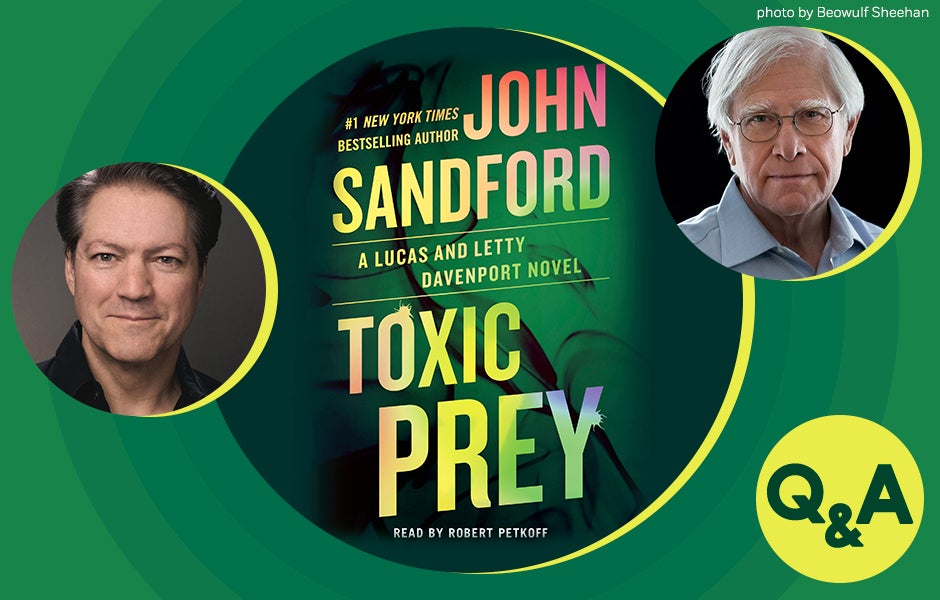
“I especially appreciate the color the audiobook adds to the back-and-forth of the patter between Virgil and Lucas and Letty; that takes some serious skill, to get the attitude right…”—John Sandford
For fans of fast-paced, cat-and-mouse mysteries, John Sandford’s #1 New York Times bestselling Prey series—featuring Minneapolis homicide investigator Lucas Davenport—is legendary. And in Toxic Prey, the 34th book (!) in the series, fans are treated to double the fun as Davenport teams up with his daughter Letty to catch a terrifying baddie before the unthinkable happens. PRH Audio was thrilled to catch up with both John and Robert Petkoff, audiobook narrator of Toxic Prey, to hear more about how the book and audiobook came to life.
PRH Audio: Hi John and Robert! Thank you for chatting with us. Before we dive in, John, could you tell us a little about Toxic Prey, and what father and daughter homicide investigator team Lucas and Letty Davenport are currently up to?
John: The new novel goes to a place I haven’t been before, a world-changing plot by an English physician and tropical disease specialist hoping to stop the climate-warming that he believes will destroy the world. I’m usually pretty down-home, setting murders in recognizable places on recognizable streets by people who might be your neighbors. Toxic Prey is nothing astonishing or science-fiction-like, in terms of bombs going off, or A.I. seizing power, but rather is pretty down-to-earth, and based, in many ways, on the Covid epidemic. Lucas and Letty are charged with finding the doctor, who is hiding out in the American southwest, preparing to release a highly virulent plague. One worrying aspect is that I believe it’s something that somebody—or some small group—could actually do.
PRH Audio: Whew. That’s chilling, to say the least! Robert, you began narrating the Prey audiobooks in 2023 after the beloved Richard Ferrone (previous narrator of the series) passed away. How did you prepare to take over such a long running series?
Robert: Well, it is daunting, to say the least, coming into the series after Richard. His voice is so distinctive that I knew I couldn’t even try to imitate him. I decided to simply narrate the stories the best way I knew how. John is such a great storyteller and the books grab the listener from the start so well that my job is actually easy. I just have to make the narration clear and John takes care of the rest.
PRH Audio: John, as you’re writing your novels, do you think about how they will translate to the audiobook format, and does that ever influence your process? And perhaps relatedly, once you hear how a narrator has interpreted your characters on audio, do those voices stick with you as you’re writing?
John: The voices do stick, and I’m lucky to have had some excellent narrators. When I do author appearances, people actually mention that—they like the drama the narrators bring to the story. It seems to me to be a bit of a throwback to the days of radio drama, which I am old enough to remember (Boston Blackie, The Shadow, The Jack Benny Show). Good stuff. I especially appreciate the color the audiobook adds to the back-and-forth of the patter between Virgil and Lucas and Letty; that takes some serious skill, to get the attitude right, and to be able to differentiate between the characters.
PRH Audio: Robert, you’ve narrated audiobooks in every genre in your career. Is there any special preparation you do before narrating a mystery/thriller like Toxic Prey, particularly when it comes to scenes with high levels of tension or a lot of action? Perhaps related, is there a scene in Toxic Prey that you’re especially excited for audiobook listeners to hear, or that was exceptionally fun to record in the studio?
Robert: My preparation for all fiction narration starts with reading the book, obviously. With Toxic Prey I use what John has created to come up with ideas for the voices of the characters. When it comes to scenes with high levels of tension or action I just let John’s writing do the work. As the action ramps up or the scene gets tense I let how it’s affecting me come through my voice. John is so good at making the reader feel what’s happening that I get caught up in the excitement and it affects my narration. Without spoiling anything, there are several scenes where the entire world is moments away from catastrophe and it is so gripping! The engineer commented several times in the studio how much they were loving the audiobook. That’s always a great sign.
PRH Audio: John, what do you hope listeners experience as they listen to your audiobooks, and particularly Toxic Prey?
John: I hope they experience the same thing that I hope book readers experience—the suspension of immediate reality, a kind of living the book as they go through it. That’s where great narrators really help. They’re not just narrating, they’re becoming story-tellers on their own. I think that you could argue that story-telling is one of the universal marks of humanity—we spend a good part of our lives telling stories to other people about ourselves, or things we’ve learned, and most people truly enjoy a good story, and a good story-teller is a force on his or her own. People read (or listen to) the Odyssey and the Iliad, by Homer, but a lot of scholars think that Homer never really wrote anything down. That he was an oral storyteller, not a writer, and his stories have now lasted almost 3,000 years.
PRH Audio: Ah, the power of the spoken word! That leads perfectly into our last question, and this one’s for both of you. Since we’re all big fans of listening over here, what is the last great thing you listened to? (It can be an audiobook, a podcast, an album, a song, anything that made for a great listening experience).
John: I listen to a lot of music, of all different kinds, but one night not long ago, when I was writing, I started streaming music from the Vietnam War era (I was in the Army from 1966-68) and it hit me pretty hard. Some of the songs were just weird (“White Rabbit”) or harsh (“It Ain’t Me”) or in some ways evocative or sorrowful (“Have You Ever Seen the Rain” or “Ohio”). Music can tell the story of your life, if you’re old enough.
Robert: The last thing I listened to was Meryl Streep narrating Tom Lake by Ann Patchett. I liked the story and Meryl’s narration is perfect. For me, Meryl Streep could just read a series of numbers and it would be interesting and entertaining. I tell any of my friends who say they don’t listen to audiobooks to just listen to a sample of her narrating and they will be hooked.
